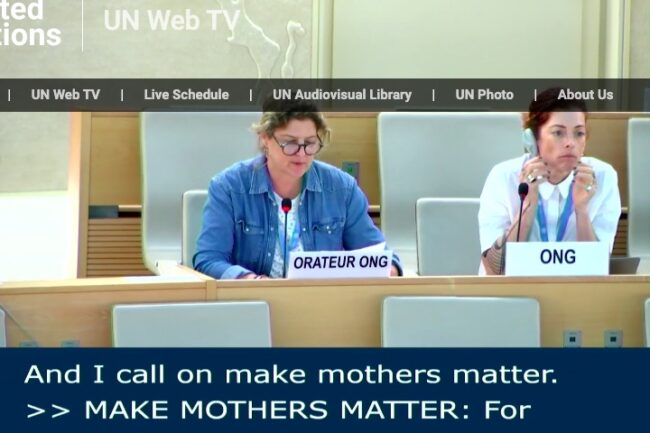A new social contract must support the unpaid work of mothers and other caregivers
30.06.23
UN Geneva, Human Rights Council - Speaking at the annual full day on women's rights, MMM once again drew attention to mothers' disproportionate share of unpaid domestic and care work, as well as the resulting social and economic injustice. As the need for a new social contract gains traction at the international level, we called for this new social contract to recognize and support the unpaid work of caring, to redistribute this essential work more equitably, and to make social security work for everyone.

The following is the full text of our statement.
For more than 75 years, Make Mothers Matter has been giving a voice to mothers, denouncing the inequitable distribution of unpaid domestic and care work as a root cause of gender inequalities and economic, social and political injustice for women, in particular when they are mothers.
Whether it’s fetching water, raising children or looking after dependents or older persons, it is still mostly women, mothers and daughters who carry out most of these essential tasks . This time-consuming work restricts their access to education, as well as their participation in other activities outside the home, in particular formal employment. It therefore also restricts their ability to benefit from social security systems, which are usually connected to formal work.
As a result, too many women, especially those with care responsibilities, remain outside social protection and invisible to policy makers. For example, 649 million women – that’s 34 % of potential mothers – still lack adequate maternity protection . Not only do women work for free, but it also comes at a cost to them and their children.
Due to their care responsibilities, women are also much less likely to reach decision-making positions – whether in the public or private sectors. Women thus remain under-represented in social policy making, and their specific constraints or circumstances are often ignored.
We at MMM call for the new envisioned social contract to:
- Recognize that unpaid care work IS indeed work, essential work, which sustains society and the economy, and deserves adequate support – including through universal social security
- Promote and support a more equitable distribution of unpaid care work, first between men and women, but also across society – with a view to support women’s leadership and participation in decision-making at all levels
- Adopt a participatory and inclusive approach to policy making so that social security systems leave no one behind, in particular mothers
Mélanie Nédelec, MMM UN Representative, delivered this oral statement during the 2nd panel of the Annual day on the human rights of women, which focused on Social protection: women’s participation and leadership, which took place during the 53rd session of the Human Rights Council.
The New EU Gender Equality Roadmap : A Call for Inclusion of Mothers
04.03.25
The European Commission’s initiative on a new Gender Equality Roadmap post-2025, marks a significant step forward in addressing gender disparities across the European Union. Make Mothers Matter (MMM
Breaking the Cycle: Gender Equality as a Path to Better Mental Health
18.03.25
The Council of the European Union has taken a decisive step in recognising the vital connection between gender equality and mental health.
Europe Must Listen to Mothers: Our landmark report heads to the European Parliament
28.08.25
On 22 September 2025, the voices of mothers will take centre stage in Brussels. For the first time, Make Mothers Matter (MMM) will present its State of Motherhood in Europe








